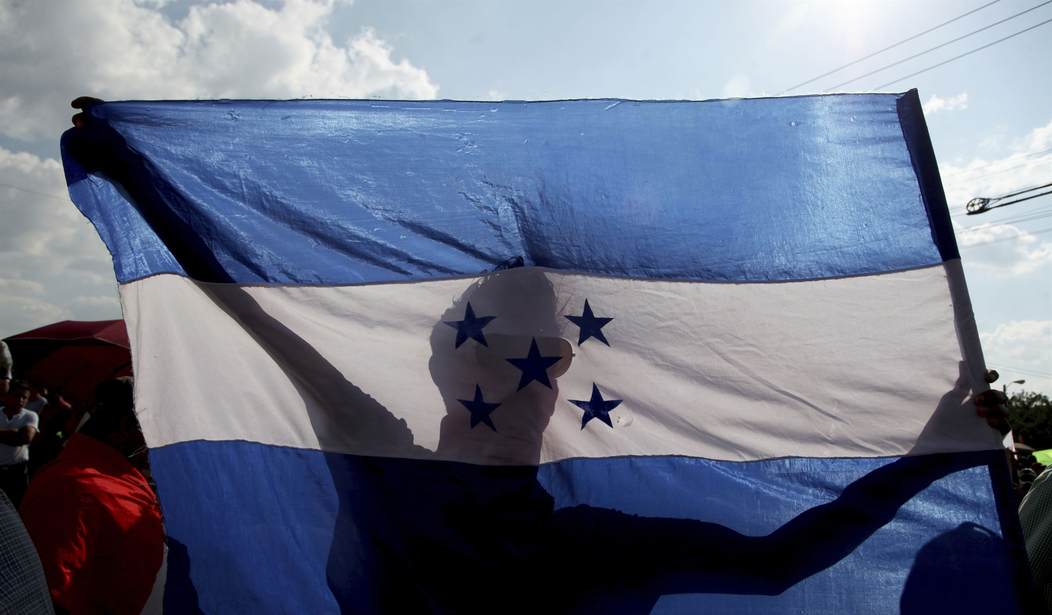The government of Honduras is at a crossroads. Honduran President Xiomara Castro has a choice. She can continue down the road of Venezuela with increased trade and diplomatic relations with despotic anti-American regimes in China and Russia or embrace freedom by retaining strong ties with the United States.
Sadly, it seems like Honduras is going the wrong way and embracing an ideology hostile to freedom, both economic and personal. And U.S. taxpayer-funded international agencies like the International Monetary Fund (IMF) and Inter-American Development Bank (IADB) have been enabling these bad choices by showering nearly $1 billion in aid on the Castro government no matter what she does to U.S. investors.
When Xiomara Castro was sworn in as President of Honduras in January of 2022, as a member of the far left Libre Party, she pledged herself to “democratic socialism” and an agenda that attacked “neo-liberalism.” Opposition to neo-liberalism is a phrase that represents an ideology that opposes free markets, favors price controls, pushes increased regulation of markets and establishes a strong top-down state influence over the economy. Vice President Kamala Harris attended her swearing in with the hopes that the Castro regime would not become hostile to American interests.
One early danger sign of hostility to American investment and a hostility to free market efforts to jumpstart the Honduran economy was the Castro administration’s treatment of the Honduran Employment and Economic Development Zones (ZEDEs). These zones allow for increased local employment and nearshoring of businesses from China to alleviate supply chain concerns. They are designed to make foreign direct investment and free-trade easier with guarantees of legal stability to developers and investors in the zones for as much as 50 years. Backed by trade treaty guarantees of fair and equitable treatment, the zones were intended to create greater certainty that American investment in that country would not be at risk of expropriation or regime uncertainty. And in the case of U.S. investor-backed ZEDE known as Próspera, promises of legal stability lured more than $100 million in private investment to Honduras.
Recommended
The Castro administration’s early decision to attempt to extinguish the ZEDEs and overturn the legal stability guaranteed U.S. ZEDE investors was just the beginning of far more sweeping attacks on trade treaty obligations. Since 2022, nine international arbitration proceedings have been filed against Honduras seeking more than $11 Billion in damages for mistreatment of investors under trade treaties. This is three times more investor litigation than is faced by any other country in Central America.
Not surprisingly, the Castro administration has drawn the ire of Congress in a letter signed by Reps. Warren Davidson (R-OH), Maria Salazar (R-FL), Greg Steube (R-FL), Nancy Mace (R-SC), Alex Mooney (R-WV), Paul Gosar (R-AZ), Byron Donalds (R-FL) and Chip Roy (R-TX). They wrote the U.S. Trade Representative Katherine Tai and Secretary of State Anthony Blinken to request the U.S. government’s “continued commitment to enforcing investor protections in U.S. trade agreements,” because they are a “foundational requirement for U.S. foreign direct investment worldwide.” These members of Congress are rightfully worried that the government of Honduras has considered changing the Honduran Constitution and violating the Dominican Republic–Central America Free Trade Agreement (CAFTA-DR). Rep. Gosar introduced the Protect U.S. Investments Act with Reps. Rick Crawford (R-AZ), Elijah Crane (R-AZ) and Bill Posey (R-FL) that would restrict aid, visas to government officials and remittances if that government is found to have violated a trade agreement. Seventeen more lawmakers from both chambers and both parties have likewise expressed concern about anti-American, anti-investment developments in Honduras.
One indication that Honduras warrants such congressional attention is the Castro administration’s recent actions towards China and Russia. Reuters reported on March 26, 2023, “China established diplomatic ties with Honduras on Sunday after the Central American country ended its decades-long relationship with Taiwan, while Taiwan's foreign minister accused Honduras of demanding exorbitant sums before being lured away by Beijing.” This came after a Honduran foreign minister started the process of opening ties with China. With regard to Russia, Honduras has recently sent 16 delegates to the country for a summit. These are concerning developments. But they haven’t stopped U.S. tax dollars from flowing to Honduras.
Our tax dollars should not reward anti-American, anti-investment policies. The Honduran government is not merely leaning left, it has taken a hard left turn and is accelerating down the road leading to Cuba and Venezuela. It is not too late for the country to reorient back towards the United States. An increasing number of U.S. lawmakers are correctly seeking to create the right incentives for the Castro administration to turn back from the cliff.
Brian Darling is former Counsel to Sen. Rand Paul (R-KY).

























Join the conversation as a VIP Member